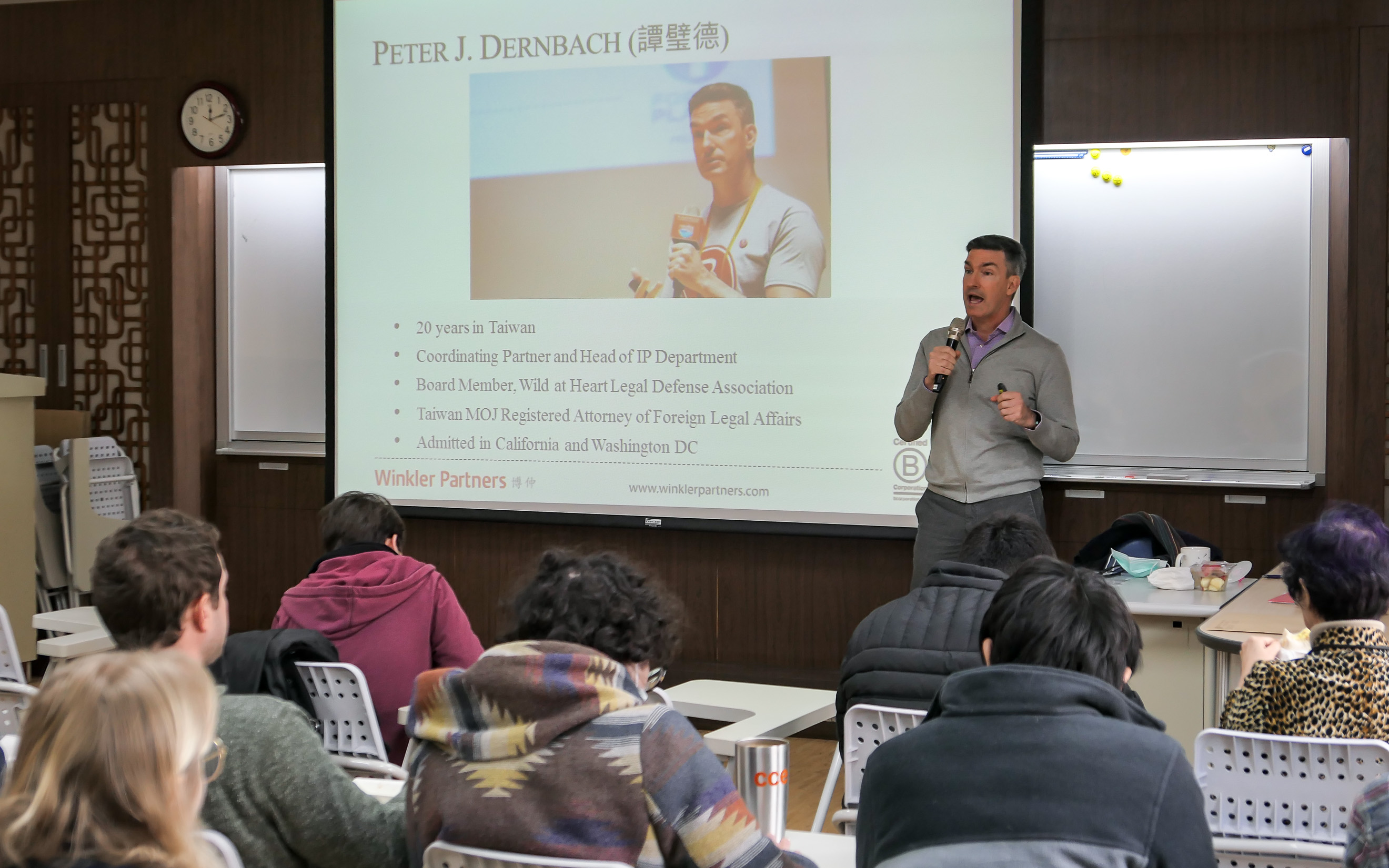
【English below】
在因應氣候變遷所需要的資源當中,「正向積極」無疑是其中最重要的之一。幸好「正向積極」也是一種可再生的資源。
「環境損害相關新聞難免令人沮喪······但是大家必須保持積極的態度」,博仲法律事務所(Winkler Partners)的合夥人譚璧德(Peter J. Dernbach)於1月31日表示。這天,ICLP特別邀請譚璧德律師來講述該事務所為加強環保所採取的各項措施,可是他也承認在環保上所下的工夫偶爾感覺就像「在泰坦尼克上重新排列躺椅」一般。
為避免感到無從下手,各位要「從眼前所能做的開始」,換言之,要從日常生活中可行的方法開始思考如何日漸改善環境。對譚璧德與他的同仁來說,事務所的日常運作上,沒有一件事情是太小而不值得考慮的。
例如,關注垃圾量跟分類的措施使博仲發現,雖然已推行的金屬便當盒與無紙化政策有助於大量減少廢棄物,但一次性杯子仍然填滿了垃圾桶。因此,博仲想出一個簡單而效果相對大的解決方案,就是為每位員工購買個人化的保溫瓶。
辦公大樓的屋頂也是實行可持續性措施的沃土,輕易就能夠成為小型循環經濟的場所。屋頂上的空中花園以廚房廢料堆肥並蒐集雨水栽培,進而將收成再帶回廚房裡成為新鮮食材,而剩餘的雨水則轉移到馬桶便可以省水。除此之外,在花園旁邊也搭建了太陽能板,能夠供應所內能源約20%的需求。
回頭看看辦公大樓裡面,透過空調和LED燈泡的置換這樣簡單的方法,從2005年至2018年之間,博仲就減少了50%以上的能源使用。譚璧德稱,「對我來說太神奇了,只是透過這些硬件的更新換代,就能節省這麼多能源。」據譚璧德的經驗,升高空調溫度、縮短電腦睡眠設置以及關閉燈具都是減少能源消耗的有效方法。
不過,博仲對碳排放總量的關注不只限於日常運作。作為一家臺灣與外國律師合夥的法律事務所,員工出於無奈還是得坐飛機去世界各地參加會議。為了抵銷航空差旅的碳排放,博仲跟ClimateCare.org合作實行購買碳抵銷政策。
在節能減碳以外,譚璧德與他的同仁亦挖空心思設法利用自己的專門知識和能力為環保工作做出積極貢獻,例如捐贈金錢和公益法律服務於「臺灣蠻野心足生態協會」,以及加入成為「捐1%給地球」計劃成員,如此實現長期的可持續性環保計畫。
結果出乎意料地好,博仲對環保的奉獻精神也帶來了許多意想不到的好處,包括被邀請到座談會分享博仲的綠色舉措,同時有機會促進其事務所的業務。譚璧德表示,「從來沒想過我會跟潛在客戶談論我們的屋頂雨水蒐集設備或如何利用蒐集來的雨水沖馬桶;想不到此舉會成為我們事務所的亮點!」
另外,濃厚的綠色精神亦有助於吸引和留住人才,他稱,「我們的法律事務所有著清楚的使命感。」
談到別的臺灣公司,譚璧德認為他們多半缺乏環保知識和信心,因此我們更該盡力增強環保意識,了解只要透過微小的改變就能夠節省很多能源。「他們真的不知從何做起,再加上他們認為實行這些環保舉措成本過高,然而除非親自嘗試,你永遠不會知道它們所帶來的效益。」
縱使博仲所推行的綠色措施在執行範圍與獻身精神上斐然可觀,面臨全球暖化的現實時,多數人卻仍不免感到悲觀失望,但是譚璧德仍然抱著樂觀的態度:「臺北的一家律師事務所從太陽能板中滿足20%的所內能源需求並不會解決一切問題,但是如果我們旁邊的大樓也有一家公司投資太陽能板而隔壁大樓也同樣跟進,那麼我們最終將達到那個扭轉暖化局勢的臨界點。」
在此之前,我們都能盼望有更多如同博仲一樣的公司來激發鄰居採取積極的環保舉措。

Among the wealth of resources needed for the battle against climate change, positivity is among the most important. Fortunately, it is renewable.
“It can be very depressing when you look at environmental news ... but you have to maintain a positive attitude,” Peter J. Dernbach of Winkler Partners told ICLP on January 31st while outlining the many steps his firm takes to enhance environmental protection, even if sometimes it feels like arranging the deck chairs on the Titanic.
To combat this languor, “we all need to start wherever we are” and first identify actionable points. For Dernbach and his colleagues, this means that no aspect of the firm’s operations is too small.
One such initiative came about thanks to waste monitoring. While metal bento boxes and a paperless policy had contributed to a significant reduction, there was still one type of waste that filled the trash cans: disposable cups. In response, the firm bought everyone personalized thermoses, a relatively small expense with an outsized effect.
The building’s roof is also fertile ground for sustainability. Fed by kitchen-scrap compost and collected rainwater, a rooftop garden brings fresh produce back into the kitchen, while the remaining water is diverted to some toilets. Beside the garden is an array of solar panels that contribute about 20% of the firm’s power supply, with any remaining power fed back into the grid.
Back inside, a simple switch to more energy-efficient air conditioners and lights saved more than 50% on energy usage between 2005 and 2018. “It was amazing to me,” Dernbach said. “We were able to reduce that much just by having some of these hardware upgrades.”
“We try not to ignore the impact that those smaller changes have when we look at our day-to-day behaviors and operations,” he said.
However, there are still some emissions that cannot be mitigated by simply swapping appliances. As a foreign-local partnership, airplane travel is a must. While impossible to eliminate, Winkler Partners does try to offset these emissions by donating to environmental causes through ClimateCare.org using its “carbon calculator.”
On top of these efforts to attain carbon neutrality, Dernbach and his colleagues also utilize their legal expertise to make proactive contributions. They support and offer pro bono services to Taiwan’s Wild at Heart Legal Defense Association, which fights for local environmental causes, and donate at least 1% of all profits to environmental NGOs through 1% for the Planet, enabling the sustainability of long-term plans.
Although not their primary objective, the firm’s green dedication has brought about a number of unforeseen benefits.
“I never thought I would be talking to potential clients about our rainwater capture on the rooftop or using that water to flush toilets; it’s not something I thought would be a differentiator,” said Dernbach, who is regularly invited to speak on panels around the world about their methods, inadvertently promoting their firm.
Potential clients might not necessarily be swayed by a rooftop garden, but it does increase the “stickiness” of relationships with existing clients and makes them more likely to extend recommendations, Dernbach said. It has even helped with attracting talent and retention.
“We as a law firm have a real sense of purpose,” he said.
At other Taiwanese companies, the green transformation has been slow.
“They don’t really know what to do and they think that it’s prohibitively expensive,” Dernbach said. “You just don’t know until you do it.”
While impressive in scope and dedication, it is easy to feel pessimistic about Winkler Partners’ initiatives — a thermos and some rooftop kale seem like a step forward, until you hear hundreds of scooters revving down the street and remember the depth of the challenge before us.
However, Dernbach remains optimistic.
“It’s not going to change everything that one law firm in Taipei gets 20% of its energy from solar panels,” he said. “But if the building next to us also has one company that invests in solar panels and the building next to them, if we keep that going, then we will eventually reach a tipping point.”
Until then, we can count on the dedication of firms like Winkler Partners and the optimism of individuals such as Dernbach to inspire the best in us.
© ICLP-NTU. ALL RIGHTS RESERVED.